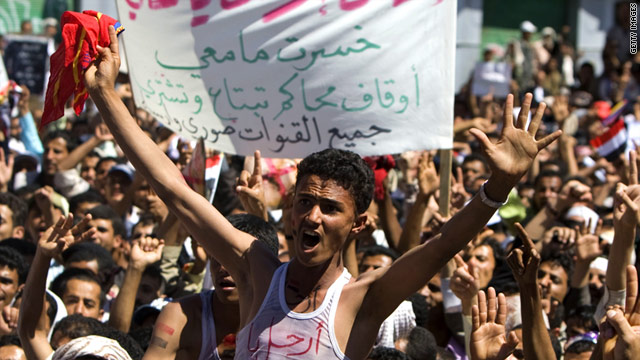
- NEW: Amnesty International says security forces are blocking access to hospital
- Medical officials say four people died and 26 were injured after clashes in Aden
- Yemini tribal leaders say they will join protests calling for the Saleh's resignation
- Witnesses say the victims are anti-government demonstrators
Sanaa, Yemen (CNN) -- Leaders of two tribal groups in Yemen say they will join protests demanding President Ali Abdullah Saleh's resignation following violent crackdowns on demonstrators in Aden.
"The Yemeni people will not stay quiet on the blood that was spilled in Aden and we will avenge for them," said Hussein Ahmar, president of the Yemen Solidarity Council, on Saturday. "We call on all those loyal to Yemen to stand with the revolution until this regime falls."
The Yemen Solidarity Council is comprised largely of member of Saleh's own Hashid tribe. Members of the Baqil tribe will also join in protests, according to Ahmar.
But Saleh appeared to be standing firm, saying Saturday during a meeting with military leaders there was a plot against Yemeni unity, according to the official Saba news agency. The agency also said Saleh received pledges of support from sheikhs and local officials from Abyan Province during a meeting Saturday.
Medical officials said Saturday that four people died and 26 were wounded -- some critically -- following clashes that erupted Friday night between anti-government protesters and security forces in southern Yemen. Amnesty International said at least 11 people had died in Friday's protests, bringing the overall death toll since protests began to 27.
The international human rights group said that it has received reports that Yemeni security officials have prevented people from taking wounded people to the hospital.
"Events in Yemen are taking a serious turn for the worse and the Yemeni security forces are showing reckless disregard for human life," said Philip Luther, the group's deputy director for the Middle East and North Africa.
Witnesses said the victims of Friday's violence were anti-government demonstrators hit by gunfire when security forces shot into crowds of protesters in the city's Mualla district after 10 p.m. Friday. Yemeni government officials could not immediately be reached for comment.
On Friday, authorities insisted no one had been killed in clashes in another part of Aden, but witnesses said one protester died of gunshot wounds and 11 demonstrators were wounded.
The violence occurred after protesters gathered Friday across Yemen to demand Saleh's resignation.
Thousands of anti-government demonstrators -- mostly students -- lined the streets outside Sanaa University in the nation's capital. They were countered by a pro-government demonstration on Tahrir Square, where thousands waved flags and held up pictures of Saleh, who has ruled Yemen since 1978.
The country has been wracked by a Shiite Muslim uprising, a U.S.-aided crackdown on al Qaeda operatives and a looming shortage of water. High unemployment has fueled much of the anger among a growing young population steeped in poverty.
Demonstrators in recent anti-government protests have also cited government corruption and a lack of political freedom.
Saleh has promised not to run for president in the next round of elections, and he has said he supports the creation of a national unity government to oversee upcoming parliamentary elections.
Baqil tribal leader Faisal Dhalee said Saleh is making a mistake in trying to hang on.
"If the ruling party had some wisdom left, than it would quickly leave power," he said.
Saleh he has refused to step aside immediately. On Monday, he compared the anti-government protests to an illness sweeping through the region.
"This is a virus and is not part of our heritage or the culture of the Yemeni people," he told reporters. "It's a virus that came from Tunisia to Egypt. And to some regions, the scent of the fever is like influenza. As soon as you sit with someone who is infected, you'll be infected."
Journalist Hakim Almasmari contributed to this report.
No comments:
Post a Comment